Skin and Hair Care for Swimmers: Expert Tips 2025
Skin and Hair Care Advice for Swimmers: Expert Tips 2025
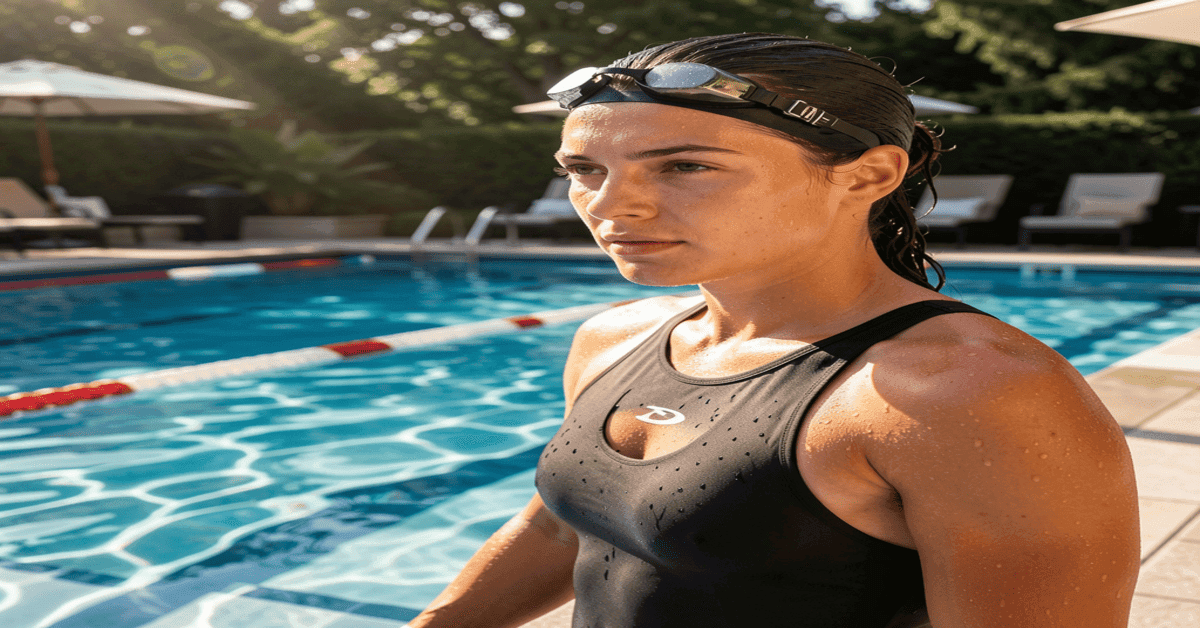
Introduction
Skin and Hair Care for Swimmers healthy hair and glowing skin is essential for anyone who swims regularly. Swimming is one of the healthiest sports—it builds strength, improves cardiovascular health, and relieves stress. However, frequent exposure to chlorine, saltwater, and the sun can lead to dryness, brittle hair, and skin irritation if proper care is not followed.
The good news is that with the right routine, you can enjoy all the benefits of swimming without compromising your hair or skin health. This detailed, dermatologist-approved guide provides the best skin and hair care advice for swimmers, helping you protect, hydrate, and restore your natural glow. Whether you swim casually or competitively, following these expert tips ensures your skin stays soft, your hair remains strong, and your body looks and feels healthy.
Table of Contents
Pre-Swim Tips: Protect Your Skin and Hair
Pre-Swim Tips Benefits
Post-Swim Skin and Hair Care
Post-Swim Benefits
Skincare Tips for Swimmers
Haircare Tips for Swimmers
Nutrition Tips for Healthy Skin and Hair
Benefits of Nutrition for Swimmers’ Skin and Hair
Quick Swimmer’s Checklist
Common Mistakes Swimmers Make
FAQ: Skin and Hair Care for Swimmers
Conclusion
Pre-Swim Tips: Protect Your Skin and Hair
Proper preparation before swimming is crucial for maintaining healthy hair and skin. Following consistent pre-swim care forms the foundation of effective skin and hair care advice for swimmers, helping minimize damage from chlorine, saltwater, and sun exposure. Here’s a detailed, dermatologist-approved guide to pre-swim protection:
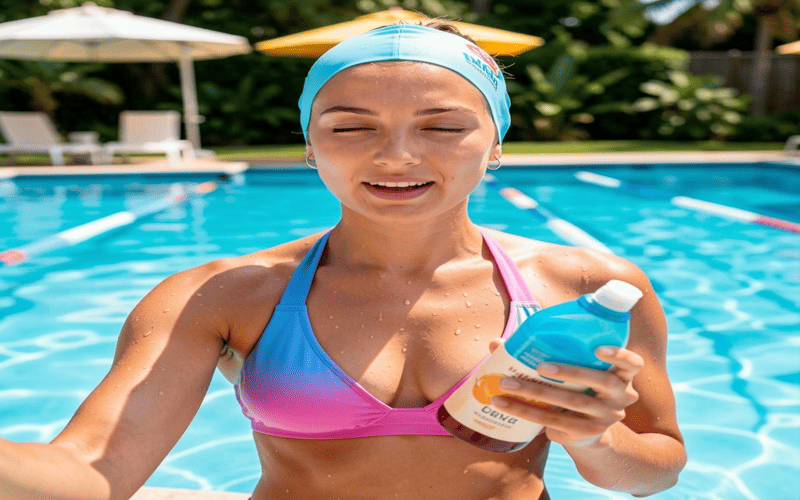
1. Take a Complete Shower Before Swimming
Rinsing your hair and skin thoroughly with lukewarm water before entering a pool or the sea reduces chlorine and saltwater absorption. Wet skin and hair absorb less of these harsh chemicals, helping prevent dryness, brittleness, and irritation. Experts recommend spending at least 2–3 minutes under the shower to ensure hair strands and pores are pre-moisturized.
Pro Tip: For hair, use a gentle, sulfate-free pre-swim shampoo or rinse to prepare your scalp. TFor more ideas, see Kerastase Hair Oil – Best Solution for Dry & Damaged Hair
2. Apply a Protective Barrier
Before diving in, apply a light layer of natural oil or swimmer-friendly lotion. Coconut, argan, or olive oil works well for hair and skin, while a water-resistant lotion protects exposed skin. This thin barrier helps prevent chlorine, salt, and other impurities from stripping natural oils.
For hair, a leave-in conditioner or lightweight oil maintains flexibility, shine, and prevents split ends. Incorporating this step reinforces your long-term skin and hair care advice for swimmers, keeping hair resilient even with frequent swimming.
3. Wear a Swimming Cap
A quality silicone or latex swim cap is essential for swimmers. While it won’t keep hair fully dry, it significantly reduces exposure to pool chemicals, saltwater, and sunlight. Caps also prevent color fading in dyed hair and learn more in Black and White Hair: Styles, Ideas & Tips for 2025
Dermatologists recommend a snug-fitting cap that fully covers the hairline to protect both hair and the delicate scalp skin. Wearing a swim cap is a simple yet vital part of any effective skin and hair care advice for swimmers routine.
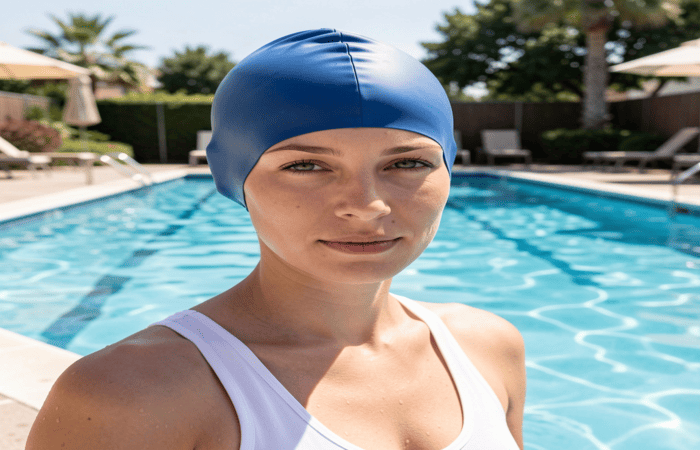
4. Stay Hydrated
Hydration plays a major role in healthy skin and hair. Even though swimming feels refreshing, your body can lose water unnoticed.
Drinking plenty of water before and after swimming keeps skin plump, reduces dryness, and strengthens hair from within. For additional nutrition tips, see 27 Health and Nutrition Tips 2026 for Better Wellness
Tip: Incorporate hydrating foods like watermelon, cucumber, and citrus fruits to boost internal hydration, complementing your external skin and hair care advice for swimmers practices.
5. Consider Pre-Swim Hair Treatments
For frequent swimmers, pre-swim hair treatments add an extra layer of protection. Options include:
- Protein sprays that coat hair strands
- Keratin-based leave-in conditioners
- Swim-specific protective serums
These treatments prevent chemical damage, maintain elasticity, shine, and softness, forming a critical component of your skin and hair care advice for swimmers program.
6. Sun Protection Before Outdoor Swimming
If swimming outdoors, apply a broad-spectrum, water-resistant sunscreen at least 20 minutes before entering the water. Focus on exposed areas such as the face, shoulders, and back. Using a sunscreen suitable for swimmers protects skin from UV damage and complements your overall skin and hair care advice for swimmers routine.
7. Time Your Swim Smartly
Swimming during peak sun hours (10 a.m.– duce sun damage, helping maintain healthy skin and hair. This simple timing strategy is rs routine.
Pre-Swim Tips: Protect Your Skin and Hair
Proper preparation before swimming is crucial for maintaining healthy hair and skin. For swimmers, consistent pre-swim care forms the foundation of effective skin and hair care for swimmers, helping minimize damage from chlorine, saltwater, and sun exposure. Here’s a detailed, dermatologist-approved guide to pre-swim protection:
(Include all the extended points from the previous message: shower, protective barrier, swim cap, hydration, pre-swim treatments, sun protection, timing.)
Pre-Swim Tips Benefits
Following these pre-swim tips provides multiple benefits for swimmers:
- Reduces chlorine and saltwater absorption – Wetting your skin and applying protective oils reduces chemical penetration.
- Protects hair from breakage and color fading – Swim caps and leave-in conditioners minimize hair damage and color loss.
- Maintains skin hydration and elasticity – Pre-swim moisturizing and hydration keep your skin soft and plump.
- Strengthens the scalp and hair from chemical stress – Regular pre-swim care shields your scalp and maintains hair health.
Post-Swim Skin and Hair Care
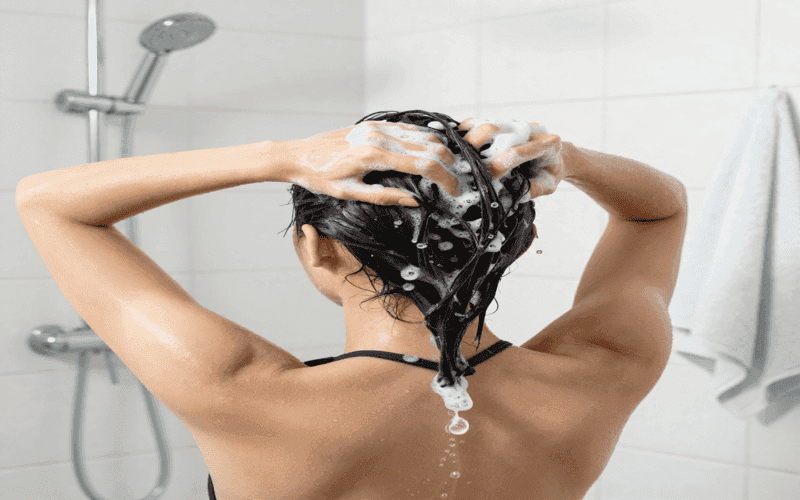
After swimming, it’s essential to restore your hair and skin. Proper post-swim care reinforces your skin and hair care for swimmers routine and helps prevent long-term dryness, irritation, and damage. Here’s a comprehensive guide:
1. Rinse Immediately After Swimming
Wash your hair and body with lukewarm water as soon as you exit the pool or sea. This removes chlorine, salt, and other chemicals before they can strip natural oils or irritate the skin. Delaying this step increases dryness, redness, and hair brittleness, so make it a non-negotiable part of your skin and hair care for swimmers routine.
Pro Tip: Use a gentle handheld showerhead to reach the scalp, behind the ears, and other areas where chlorine can linger.
2. Use Swimmer-Friendly Shampoos and Cleansers
Choose sulfate-free shampoos specifically formulated for swimmers to remove chlorine while maintaining natural oils. For your skin, opt for pH-balanced, mild cleansers like Cetaphil Gentle Skin Cleanser Review 2025 — Truth & Results that protect your skin barrier and restore hydration.
Extra Tip: Look for shampoos with natural oils like argan or coconut oil, which help replenish moisture lost during swimming, further enhancing your skin and hair care for swimmers regimen.
3. Moisturize and Nourish
Immediately after rinsing, apply rich, hydrating moisturizers to your skin and leave-in conditioners or hair masks to your hair. Ingredients like hyaluronic acid, ceramides, keratin, or argan oil are excellent for locking in moisture, Check Skin Flooding: The 2025 Skincare Trend for Deep Hydration and Glowing Skin for recommended moisturizing routines.
For swimmers, this step is critical to maintain both hair strength and skin elasticity as part of a long-term skin and hair care for swimmers routine.
4. Weekly Deep Conditioning and Exfoliation
Once or twice a week, treat your hair with a nourishing mask or deep conditioner to repair damage, strengthen strands, and restore shine. For skin, gentle exfoliation removes dead skin cells and chemical buildup, helping prevent clogged pores, irritation, and dryness.
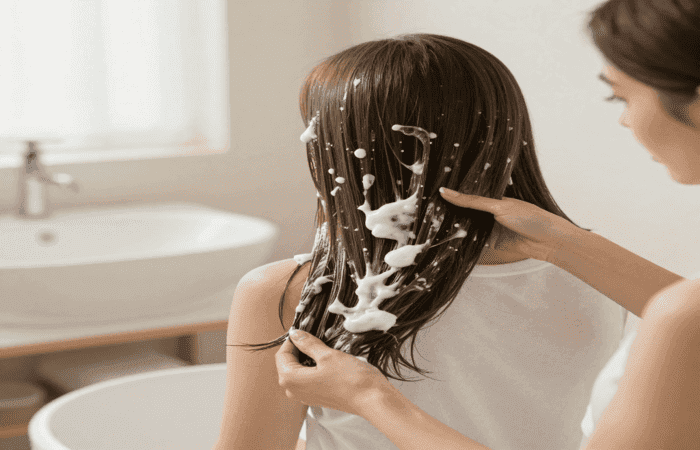
This weekly maintenance is a cornerstone of any effective skin and hair care for swimmers program.
5. Protect Sensitive Areas
Chlorine and saltwater can irritate delicate areas like the scalp, lips, and under-eye skin. Incorporate:
- Gentle scalp treatments to prevent flaking and dryness
- SPF lip balms to protect lips from UV damage
- Nourishing eye creams to keep under-eye skin soft and hydrated
These small but essential steps ensure your post-swim routine is comprehensive, supporting long-term skin and hair care for swimmers.
6. Optional: Apply Antioxidant Serums
For outdoor swimmers, consider applying a lightweight antioxidant serum containing vitamins C or E after your swim. This helps neutralize free radicals caused by sun exposure and chlorine, further supporting healthy skin and hair.
Post-Swim Benefits
Following a proper post-swim routine provides multiple advantages:
- Removes chlorine and salt residues to prevent dryness
- Restores skin hydration and elasticity
- Strengthens hair and reduces breakage
- Soothes the scalp and sensitive areas
- Protects against long-term chemical and sun damage
Skincare Tips for Swimmers
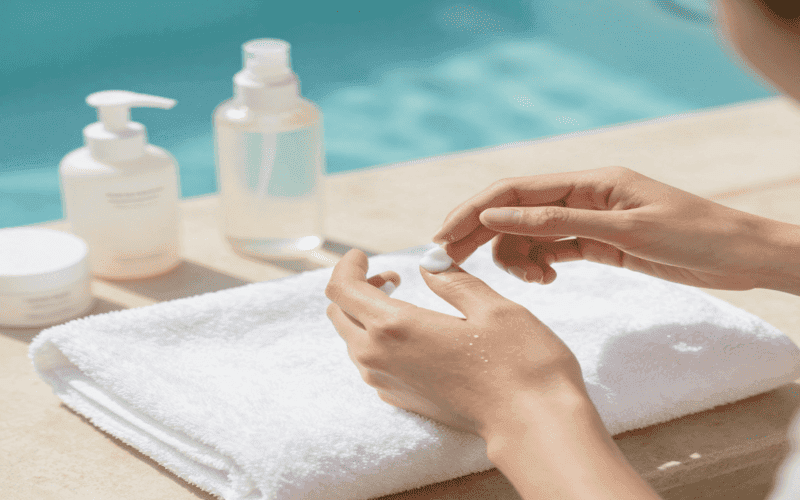
Swimming can strip your skin of natural oils. Follow these tips to maintain a healthy skin and hair care for swimmers routine:
- Hydrate Your Skin: Apply a water-based moisturizer before swimming and a richer cream afterward.
- Use Sunscreen Outdoors: Apply broad-spectrum, water-resistant SPF 30+ at least 20 minutes before outdoor swimming. Reapply every 2 hours.
- Exfoliate Weekly: Gentle scrubs or chemical exfoliants (like lactic acid) help remove chlorine and sweat residues.
- Avoid Harsh Cleansers: Use mild, sulfate-free products to protect your natural barrier.
- Swimmer-Specific Skincare Products: Consider products designed to neutralize chlorine and soothe irritation.
Haircare Tips for Swimmers
Swimming is excellent for overall health, but hair often suffers the most. Chlorine in pools strips natural oils, while saltwater dehydrates strands, leaving hair brittle, dull, and prone to breakage. Effective skin and hair care for swimmers includes both protective and restwim Hair Protection
Before swimming, apply a leave-in conditioner, lightweight oil, or swimmer-specific hair serum. These products create a protective barrier, reducing chemical absorption and keeping strands soft and manageable.
Pro Tip: Coat hair thoroughly, focusing on ends, which are the most vulnerable to damage.
2. Wear a Swimming Cap
A silicone or latex swim cap is a simple yet highly effective way to reduce direct exposure to chlorine and saltwater. For swimmers with dyed or chemically treated hair, a cap helps prevent color fading and breakage. Wearing a cap is a key part of maintaining strong skin and hair care for swimmers.
3. Rinse and Wash Immediately After Swimming
Rinse hair thoroughly with lukewarm water as soon as you finish swimming. Follow with a swimmer-friendly shampoo that removes chlorine and restores natural oils. Avoid harsh shampoos containing sulfates, as they can worsen dryness and hair damage.
Extra Tip: Massage your scalp gently to stimulate circulation and remove any chemical residue.
4. Deep Condition Weekly
Once a week, use a nourishing hair mask rich in ingredients like argan oil, shea butter, keratin, or protein. This strengthens hair, restores shine, and repairs damage caused by repeated exposure to pool chemicals or saltwater.
5. Scalp Care
Your scalp is part of your hair’s foundation, and chlorine or saltwater can cause irritation, dryness, and flaking. Use gentle scalp scrubs, hydrating oils, or soothing serums to maintain scalp health as part of your skin and hair care for swimmers routine.
6. Avoid Excess Heat Styling
After swimming, hair may already be dry. Limit the use of hair dryers, straighteners, or curling irons immediately after swimming to prevent further breakage. Allow hair to air-dry whenever possible, then follow with leave-in conditioners or oils.
7. Protect Hair from Sun Damage
For outdoor swimming, apply a UV-protective hair spray or leave-in conditioner. Sun exposure can exacerbate dryness and fade color, so UV protection complements your skin and hair care for swimmers routine.
Haircare Benefits
Following these steps helps swimmers:
- Reduce chemical and saltwater damage
- Prevent hair breakage and split ends
- Maintain shine, softness, and elasticity
- Protect scalp health and reduce flaking
- Preserve color-treated or chemically treated hair
Nutrition Tips for Healthy Skin and Hair
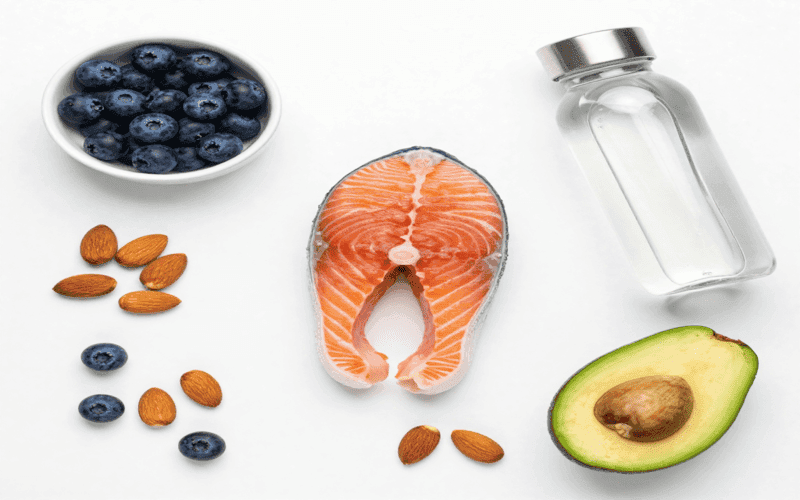
While external care is essential, internal nutrition plays a vital role in maintaining strong, healthy skin and hair. Swimmers often overlook this aspect, but a balanced diet complements your skin and hair care for swimmers routine, helping to repair and protect against chemical and sun damage.
1. Stay Hydrated
Drinking plenty of water is the simplest yet most important step for healthy skin and hair. Proper hydration maintains skin elasticity, prevents dryness, and supports hair strength from root to tip. Swimmers should aim for at least 8–10 glasses of water daily, and even more during intense training or hot weather.
2. Include Omega-3 Fatty Acids
Omega-3 fatty acids nourish your skin and hair from within. Foods like salmon, mackerel, walnuts, chia seeds, and flaxseeds reduce dryness, strengthen hair strands, and help maintain a supple, radiant complexion. Regular consumption supports an effective skin and hair care for swimmers routine.
3. Consume Antioxidant-Rich Foods
Chlorine, saltwater, and sun exposure can create free radicals that damage skin and hair cells. Incorporate vitamin C- and E-rich fruits and vegetables such as oranges, berries, spinach, and bell peppers to combat oxidative stress, promote collagen production, and enhance overall skin and hair health.
4. Prioritize Protein Intake
Hair is primarily made of protein (keratin), so consuming adequate protein is essential for repair and growth. Include lean meats, eggs, dairy, legumes, and nuts in your diet to strengthen hair and maintain resilient skin. Protein also supports faster recovery from chemical and environmental stress caused by swimming.
5. Additional Nutrients for Swimmers
- Zinc: Found in pumpkin seeds, chickpeas, and lean meats; supports hair growth and scalp health.
- Biotin: Eggs, almonds, and sweet potatoes help maintain strong, healthy hair.
- Vitamin D: Sun exposure is limited in indoor pools; consider fortified foods or supplements to maintain skin and hair health.
Benefits of Nutrition for Swimmers’ Skin and Hair
Integrating these nutritional habits helps swimmers:
- Maintain skin hydration and elasticity
- Strengthen hair and prevent breakage
- Repair oxidative damage from chlorine and sun exposure
- Support overall scalp and hair health
- Enhance the effectiveness of external skin and hair care routines
Quick Swimmer’s Checklist
Maintaining consistent pre- and post-swim routines is essential for effective skin and hair care for swimmers. Use this practical checklist before and after each swim to protect your hair, skin, and overall health:
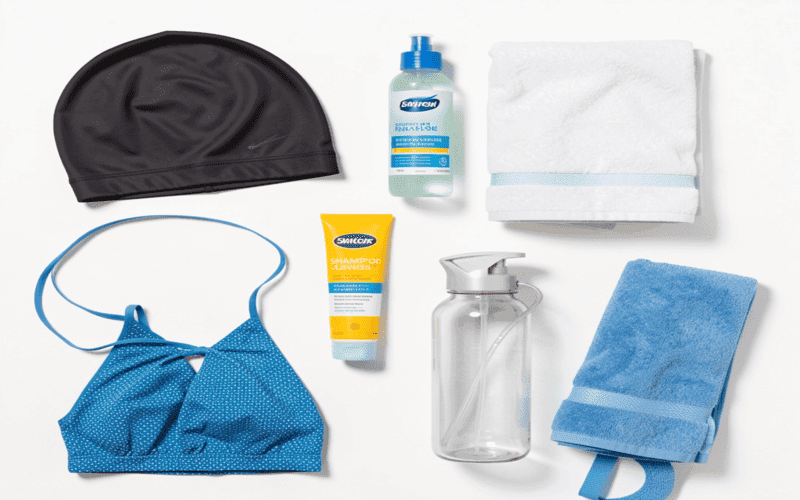
Before Swimming:
✅ Shower Before Swimming – Rinse your hair and skin with clean water to reduce chlorine absorption.
✅ Apply Protective Oil or Leave-In Conditioner – Create a barrier on hair and skin to prevent dryness and brittleness.
✅ Wear a Swim Cap – Protects hair from chlorine and saltwater, and minimizes exposure to sun damage.
After Swimming:
✅ Rinse Thoroughly After Swimming – Wash off chlorine, salt, and other chemicals immediately to prevent irritation and dryness.
✅ Use Swimmer-Friendly Shampoo and Cleanser – Gentle, sulfate-free products help remove chemicals while preserving natural oils.
✅ Moisturize Deeply – Hydrate skin with rich creams and nourish hair with leave-in conditioners or hair masks.
✅ Apply Sunscreen for Outdoor Swimming – Protects exposed skin from harmful UV rays.
✅ Hydrate Internally – Drink plenty of water to support skin elasticity and hair strength from within.
Optional Tips for Swimmers:
- Carry a small towel or microfiber cloth for quick post-swim drying.
- Apply lip balm with SPF and gentle eye cream for sensitive areas.
- Schedule weekly deep conditioning for hair and exfoliation for skin.
Common Mistakes Swimmers Make
Even experienced swimmers can unknowingly damage their hair and skin if they skip essential steps. Avoid these common mistakes to maintain an effective skin and hair care for swimmers routine:
1. Skipping Immediate Post-Swim Rinse
Waiting too long to rinse off chlorine or saltwater allows chemicals to penetrate hair and skin, leading to dryness, irritation, and breakage. Always rinse immediately after swimming to protect your skin and hair.
2. Using Harsh Soaps or Shampoos Daily
Regular soaps and shampoos with sulfates can strip natural oils from hair and skin, exacerbating dryness. Opt for gentle, swimmer-friendly products to maintain hydration and strengthen your hair as part of your skin and hair care for swimmers routine.
3. Forgetting Sunscreen During Outdoor Swims
Even short exposure to sunlight can damage your skin and accelerate aging. Neglecting sunscreen reduces the effectiveness of your skin and hair care for swimmers efforts. Use a broad-spectrum, water-resistant SPF 30+ before outdoor swimming and reapply every two hours.
4. Neglecting Scalp Care
Chlorine and saltwater can irritate the scalp, causing itching, dryness, and flaking. Failing to care for your scalp can compromise hair growth and overall hair health. Gentle scalp treatments or hydrating oils are essential for maintaining a strong skin and hair care for swimmers routine.
5. Ignoring Hydration and Nutrition
External care alone isn’t enough. Without proper hydration and a nutrient-rich diet, skin and hair become weak and more prone to damage. Drinking water and consuming foods rich in omega-3 fatty acids, antioxidants, and protein supports your skin and hair care for swimmers from the inside out.
Quick Takeaway
By avoiding these mistakes, swimmers can protect their hair and skin, ensuring that pre- and post-swim routines are effective and long-lasting. Correcting these habits is a simple yet powerful way to improve your overall skin and hair care for swimmers strategy.
FAQ: Skin and Hair Care for Swimmers
Q1: How often should swimmers use hair masks?
A: At least once a week to repair dryness and restore shine.
Q2: Can swimming fade hair color?
A: Yes, chlorine can strip color. Use protective caps and color-safe shampoos.
Q3: Which moisturizer is best for swimmers?
A: Water-based before swimming, rich cream afterward, preferably with hyaluronic acid or ceramides.
Q4: Is sunscreen necessary for indoor pools?
A: Not usually, unless sunlight enters through windows.
Q5: Can diet improve skin and hair for swimmers?
A: Absolutely. Hydration, omega-3 fatty acids, antioxidants, and protein support healthy skin and hair.
Conclusion
Swimming should enhance your health, not harm your hair or skin. By following these dermatologist-approved skin and hair care for swimmers tips, you can enjoy every swim while keeping your skin soft, hair strong, and body healthy.
Consistent pre- and post-swim routines, proper hydration, balanced nutrition, and protective measures ensure your skin remains nourished, your hair stays shiny, and your overall appearance stays vibrant. Incorporating these practices into your daily regimen is the key to effective skin and hair care for swimmers, helping you look and feel your best—both in and out of the water.







5 Comments